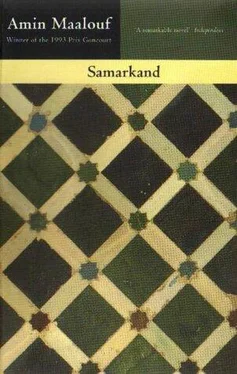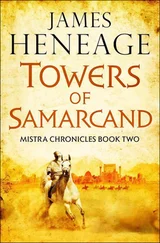A parable from the Samarkand Manuscript:
‘Three friends were taking a walk on the high plateaus of Persia. A panther sprang out at them with all the fierceness in the world.
‘The panther looked at the three men for a long while and then ran toward them.
‘The first was the oldest, the richest and the most powerful. He cried out: “I am the master of these districts. I shall never allow a beast to ravage the lands which belong to me.” He had with him two hunting dogs and set them on to the panther. They managed to bite it but the panther only became stronger, overwhelmed them, jumped on their master and ripped out his intestines.
‘Thus was the fate of Nizam al-Mulk.
‘The second man wondered: “I am a man of knowledge, everyone honours and respects me. Why should my fate be decided by dogs and a panther?” He turned tail and fled without waiting for the outcome of the fight. Since then he has wandered from cave to cave, from hut to hut, convinced that the wild beast was always at his heels.
‘Thus was the fate of Omar Khayyam.
‘The third was a man of belief. He walked toward the panther with his hands open, with a dominating demeanour and an eloquent words. “You are welcome to these lands,” he said to the panther. “My companions were richer than I and you despoiled them. They were prouder than I and you have laid them low.” The beast listened, seduced and subdued. The man had the advantage over the panther, and managed to train it. Since then no panther has dared to approach him and men keep away.’
The Manuscript concludes: ‘When the time of upheavals arrived, no one could stop its course, no one could flee it but some managed to use it. Hassan Sabbah, more than anyone, knew how to tame the ferocity of the world. He sowed fear all around him in order to make a tiny piece of calm for himself in his redoubt of Alamut.’
No sooner had he gained control of the fortress than Hassan Sabbah undertook actions to assure that he was sealed off from any contact with the outside world. His first priority was to render impossible any enemy penetration. With the help of some clever building he thus improved the already exceptional quality of the site by blocking off the slightest passageway between two hills.
However these fortifications were not enough for Hassan. Even if an assault was impossible, the besiegers would still hope to starve him out or cut off his water. It is thus that most sieges end. And it was on this point that Alamut was particularly vulnerable, having only meagre stocks of drinking water. The Grand Master found the answer. Instead of drawing his water from the neighbouring rivers, he had an impressive network of cisterns and canals dug in the mountain to collect rainwater and the melting snows. The visitor to the ruins of the castle today can still admire, in the large room where Hassan lived, a ‘magic basin’ which filled itself up with as much water as was taken out from it, and which, by a stroke of ingenuity, never overflowed.
For provisions, the Grand Master had storage shafts fitted out for oil, vinegar and honey, he also stockpiled barley, sheep fat and dried fruit in sufficient quantities to get them through an almost total blockade — which, at that time, was far beyond the capacity of any besiegers, particularly in a region which had a harsh winter.
Hassan thus had an infallible shield. He had, one could say, the ultimate defensive weapon. With his devoted killers, he also possessed the ultimate offensive weapon. How can precautions be taken against a man intent on dying? All protection is based upon dissuasion, and we know that important personages are surrounded by an imposing guard whose role is to make any potential attacker fear inevitable death. But what if the attacker is not afraid of dying, and has been convinced that martyrdom is a short-cut to paradise? What if he has imprinted in his mind the words of the Preacher: ‘You are not made for this world, but for the next. Can a fish be afraid if someone threatens to throw it into the sea?’ If, moreover, the assassin had succeeded in infiltrating the victim’s entourage? Nothing could be done to stop him. ‘I am less powerful than the Sultan but I can harm you more than he can,’ Hassan wrote one day to a provincial governor.
Thus, having forged the most perfect tools of war imaginable, Hassan Sabbah installed himself in his fortress and never left it again; his biographers even say that during the last thirty years of his life he only went out of his house twice, and both times it was to go up on the roof! Morning and evening he was there, sitting cross-legged on a mat which his body had worn out but which he never wished to change or have repaired. He taught, he wrote, he set his killers on to his enemies, and, five times a day he prayed on the same mat along with whoever was visiting him at the time.
For the benefit of those who have never had the opportunity to visit the ruins of Alamut, it is worth pointing out that this site would not have acquired such historical importance if its only advantage had been its inaccessibility and if the plateau at the mountain’s summit had not been large enough to support a town, or at least a very large village. At the time of the Assassins it was reached by a narrow tunnel to the east which emerged into the lower fortress with its tangle of alleys and little mud houses in the shadow of the walls; the upper fortress was reached by crossing the maydan , the large square, the only meeting area for the whole community. This was shaped like a bottle lying on its side, with its wide base in the east and its neck toward the west. The bottleneck itself was a heavily guarded corridor at the end of which lay Hassan’s house whose single window looked out on to a precipice. It was a fortress within a fortress.
By means of the spectacular murders which he ordered, and the legends which grew up around him, his sect and his castle, the Grand Master of the Assassins terrorized the Orient and the Occident over a long period. In every Muslim town high officials fell and even the crusaders had two or three eminent victims to lament. However it is all too often forgotten that it was primarily at Alamut that terror reigned.
What reign is worse than that of militant virtue? The Supreme Preacher wanted to regulate every second of his adherents’ lives. He proscribed all musical instruments; if he discovered the smallest flute he would break it in public and throw it into the flames; the transgressor was put in irons and given a good whipping before being expelled from the community. The use of alcoholic drinks was even more severely punished. Hassan’s own son, found intoxicated one evening by his father, was condemned to death on the spot; in spite of his mother’s pleadings he was decapitated at dawn the next day as an example. No one ever dared to swallow a mouthful of wine.
The justice of Alamut was, to say the least, speedy. It was said that a crime had been committed one day within the fortress and that a witness had accused Hassan’s second son. Without attempting to verify the fact, Hassan had his last son’s head cut off. A few days later, the real culprit confessed; he in turn was decapitated.
Biographers of the Grand Master mention the slaughter of his son in order to illustrate his strictness and impartiality; they point out that the community of Alamut became a haven of virtue and morality through the blessing of such exemplary discipline, and this can very easily be believed; however, we know from various sources that the day after these executions Hassan’s only wife as well as his daughters rose up against his authority, and that he ordered them thrown out of Alamut and recommended that his successors do the same in the future in order to avoid the womenfolk having any influence over their correct judgement.
Читать дальше












